

197 Educational YouTube Channels You Should Know About. 197 Educational YouTube Channels You Should Know About If you don’t have a YouTube channel as an education provider, there’s a good chance you’re behind the times.
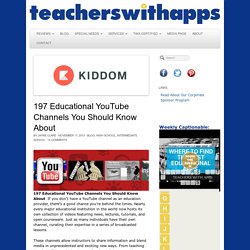
Nearly every major educational institution in the world now hosts its own collection of videos featuring news, lectures, tutorials, and open courseware. Just as many individuals have their own channel, curating their expertise in a series of broadcasted lessons. These channels allow instructors to share information and blend media in unprecedented and exciting new ways. National Curriculum.
My biggest mistake as an ICT Co-ordinator - ICT in Education - Educational Technology. Act 1, Scene 1Setting: an interview room.Chair of Governors: So, Mr Freedman, do you have any questions you would like to ask US?

Terry Freedman: Yes. What are YOUR criteria of a successful ICT Co-ordinator? Headteacher: I want to see teachers banging on the doors of the computer labs demanding to be let in. Well, I got the job, and with the Headteacher's comment in mind I set about making sure the computer facilities were being used as intensively and extensively as possble. I did quite a few really good things, if I do say so myself, such as: * I found out why many teachers were reluctant to use the facilities. . * I made it really easy to book the rooms. * I created a buzz about using ICT.
Internet Research: Fact or Fiction? The 7 Most (And Least) Effective Ways To Improve Student Achievement. The Teacher's Guides To Technology And Learning. The 7 Characteristics of Teachers Who Use Technology Effectively. I just came across this awesome graphic shared by our colleagues in teachthought and I found it really interesting.
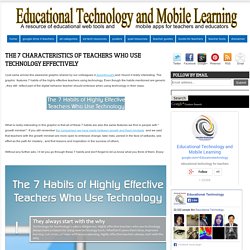
The graphic features 7 habits of the highly effective teachers using technology. Even though the habits mentioned are generic , they still reflect part of the digital behavior teacher should embrace when using technology in their class. What is really interesting in this graphic is that all of these 7 habits are also the same features we find in people with " growth mindset ". If you still remember the comparison we have made between growth and fixed mindsets and we said that teachers with the growth mindset are more open to embrace change, take risks, persist in the face of setbacks, see effort as the path for mastery , and find lessons and inspiration in the success of others. 14 Technology Concepts Every Teacher should Know about. We have compiled for you this list of some trending educational technology terms.The list below is a simple attempt to help you better capture the full picture of what all these tech terms are about by providing clear definitions to each one of them.
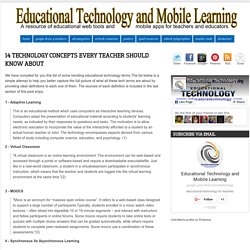
The sources of each definition is included in the last section of this post enjoy 1 - Adaptive Learning. 10 steps technology directors can take to stay relevant SmartBlogs. The role of the typical school district technology director has become obsolete.
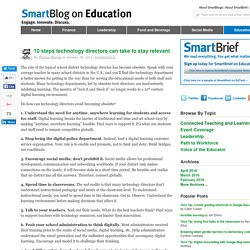
Speak with your average teacher in many school districts in the U.S., and you’ll find the technology department is better known for getting in the way than for serving the educational needs of both staff and students. Many technology departments, led by obsolete tech directors, are inadvertently inhibiting learning.
The 6 Biggest Challenges Of Using Education Technology. In an unplanned series of sorts, we’re showcasing a couple of posts about the 2013 NMC/EDUCAUSE Learning Initiative Horizon Report for Higher Education . We’ve already talked about the key trends in the report , but it also addressed another important topic when it comes to classroom technology – the challenges involved with implementing new technologies. The Horizon Report identified six broad challenges to implementation which span the widest range of users – while recognizing that there are many significant local barriers that present their own challenges as well. They’ve taken some of the obvious issues such as financial limitations and physical limitations (getting wifi through the thick bunker-like walls of some 1940′s buildings, for example) and looked more specifically at the nature of higher education and how that presents challenges to implementing new technology.
Handheld Technologies. Educational Technology and Mobile Learning: Networked Learning Explained. We are living in a highly connected and information-rich world.Over the last 20 years or so, technology has reorganized how we live, how we communicate, and how we learn.
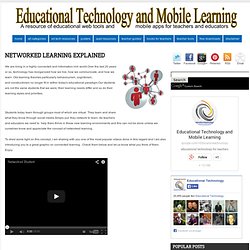
Old learning theories particularly behaviourism, cognitivism, and constructivism no longer fit in within today's educational paradigm.Our students are not the same students that we were, their learning needs differ and so do their learning styles and priorities. Students today learn through groups most of which are virtual. They learn and share what they know through social media.Simply put: they network to learn.
As teachers and educators we need to help them thrive in these new learning environments and this can not be done unless we ourselves know and appreciate the concept of networked learning. Education Trends: What to Expect in 2013. The education landscape has been witnessing a range of new developments that are likely to expand in 2013.
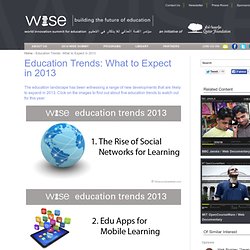
Click on the images to find out about five education trends to watch out for this year: © 60secondmarketer.com © blogs.2elearning.com and appsforipad.org © techbrarian.com © gloomyguppy07.deviantart.com. How to Succeed in Education Technology. Most of today's education technology startups are doomed to fail.
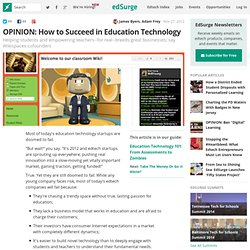
"But wait! " you say. "It's 2012 and edtech startups are sprouting up everywhere, pushing real innovation into a slow-moving yet vitally important market, gaining traction, getting funded! " True. Yet they are still doomed to fail. They're chasing a trendy space without true, lasting passion for education; They lack a business model that works in education and are afraid to charge their customers; Their investors have consumer Internet expectations in a market with completely different dynamics;It's easier to build novel technology than to deeply engage with students and teachers to understand their fundamental needs. That's the bad news. Of course, you may succeed largely by accident. Along the way we've formed a strong opinion about what success means for us, and the short list of characteristics we believe are crucial for the success of edtech companies.
A few words of warning: The universe of education is huge. Passion. Free for Download: The Updated Freedom Stick. It is time for Universal Design for Learning to be put in the hands of every student. It is time for every student to be given the opportunity to discover and experiment with a range of tools which can support their own individual differing communication needs – not just in school, but throughout their lives. Schools, traditionally, have provided students one way to do things. If the class was supposed to read something, everyone had the same technology – paper with alphabetical symbols printed on it which students needed to “decode.” If the class was supposed to write, everyone had the same technology – usually a pencil or a pen used to create alphabetical symbols on paper. If the class was supposed to get “organized,” everyone had the same technology – an “assignment book” or perhaps the infamous “middle school planner.”
The new and improved “Freedom Stick” (v.2.3.2) offers students and schools the ability to arrive at this ‘technological present’ at essentially zero cost. Why K-12 schools are failing by not teaching SEARCH. Some rights reserved by flickr ID: miguelavg This past week I had the opportunity to spend a day with some of the faculty at Western Washington University talking about reverse instruction…or at least my idea of what that means.
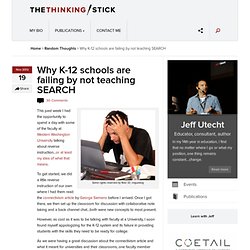
To get started, we did a little reverse instruction of our own where I had them read the connectivism article by George Siemens before I arrived. Once I got there, we then set up the classroom for discussion with collaborative note taking and a back channel chat…both were new concepts to most present.